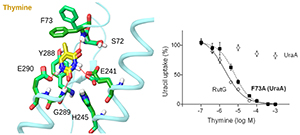The Laboratory of Biological Chemistry
The Laboratory of Biological Chemistry at the University of Ioannina, Medical School, involves six active research groups with expertise in a range of research areas, including membrane trafficking and signalling in endothelial cells (Fotsis T, Christoforidis S), free radical and oxidative stress mechanisms (Galaris D), histone chaperones and chromatin remodelling (Papamarcaki T), structural biology with emphasis on chromatin proteins (Politou A) and structure-function analysis of active transport proteins (Frillingos S). The complementation of projects and research viewpoints provides an appropriate academic environment for exchange of ideas and different experimental approaches and promoting new collaborations. The Laboratory of Biological Chemistry is equipped with up-to-date scientific instrumentation for all aspects of cellular and molecular biology research, including the following units:
- Molecular Biology and Recombinant DNA technology, including PCR, hybridization, DNA electrophoresis, southern, northern
- Protein analysis, centrifuges including Optima ultracentrifuge, Speedvac concentrator, French Press, sonicator, spectrophotometers, ELISA reader
- Cell Culture, including three CO2 incubators, cell counter, phase contrast inverted microscope, two Laminar flow hoods (Microflow)
- Fast Protein Liquid Chromatography system (FPLC) and High Pressure Liquid Chromatography (HPLC), protein electrophoresis, Western blotting, power supplies
- Fluorescence Microscopy, including semi-automated cell injection system (inverted microscope, microinjection system, and capillary micropipette puller), fluorescence microscope with image analysis software, confocal microscope, real-time video microscope
- DNA Microarrays, including confocal microarray laser scanner and associated hardware and data-processing software, bioanalyzer for DNA/RNA quality analysis, real time PCR
- Fluorescence Spectrophotometer
- Circular Dichroism (CD) Spectropolarimeter
- Liquid Scintillation beta-counter, as well as Fluorescence Activated Cell Sorter (flow cytometer), shared with the Clinical and Basic Functional Sciences Division of the Medical School
- Advanced Microscopy Unit, including Phase contrast and immunofluorescence inverted microscopes, Video-microscope with image analysis system, Microinjection system, STED (Stimulated Emission Depletion Microscope) and TIRF (Total Internal Reflection Fluorescence Microscope), shared with FORTH-BRI
- Experimental Animal House, with approximate capacity for 80 mice, 300 rats and 60 rabbits (direct access to this facility)
Frillingos lab makes daily use of part of this infrastructure including all molecular biology and protein facilities, liquid scintillation counter and biophysical analysis units (fluorescence spectroscopy, CD), which are highly appropriate for the research focused on membrane transport proteins and elucidation of their structure-function relationships.


